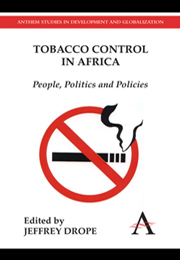Book contents
- Frontmatter
- Contents
- List of Figures and Tables
- Foreword
- Preface
- Acknowledgments
- List of Abbreviations and Acronyms
- 1 Introduction
- 2 The Political Mapping Process
- 3 Progress on Smoke-Free Policies
- 4 Taxation as a Tobacco Control Strategy
- 5 The Challenges of Implementing Bans on Advertising, Promotion and Sponsorship
- 6 The Pursuit of Packaging and Labeling Requirements
- 7 Burkina Faso
- 8 Cameroon
- 9 Eritrea
- 10 Ghana
- 11 Kenya
- 12 Malawi
- 13 Mauritius
- 14 Nigeria
- 15 Senegal
- 16 South Africa
- 17 Tanzania
- 18 Zambia
- 19 Conclusion: Tobacco Control in Africa – People, Politics and Policies
- Notes on Contributors
- Index
19 - Conclusion: Tobacco Control in Africa – People, Politics and Policies
Published online by Cambridge University Press: 05 March 2012
- Frontmatter
- Contents
- List of Figures and Tables
- Foreword
- Preface
- Acknowledgments
- List of Abbreviations and Acronyms
- 1 Introduction
- 2 The Political Mapping Process
- 3 Progress on Smoke-Free Policies
- 4 Taxation as a Tobacco Control Strategy
- 5 The Challenges of Implementing Bans on Advertising, Promotion and Sponsorship
- 6 The Pursuit of Packaging and Labeling Requirements
- 7 Burkina Faso
- 8 Cameroon
- 9 Eritrea
- 10 Ghana
- 11 Kenya
- 12 Malawi
- 13 Mauritius
- 14 Nigeria
- 15 Senegal
- 16 South Africa
- 17 Tanzania
- 18 Zambia
- 19 Conclusion: Tobacco Control in Africa – People, Politics and Policies
- Notes on Contributors
- Index
Summary
Attempting to sum up the expansive work to change public health policy across 12 countries is a daunting but invigorating task. Arguably, the best avenue to a meaningful summary and fi nal analysis is to reexamine and synthesize some of the themes that emerge from the preceding chapters, including several that might be less obvious to the casual reader. We, the authors and editor, have sought purposefully to be mindful of drawing too much inference from this research. This decision is a result of our dissatisfaction with earlier work that claims too much causality when the evidence is simply not strong enough or offers explanations that are too facile. While duly acknowledging these concerns, we believe that we have examined the roles of and relationships among key actors and institutions involved in tobacco control policy in Africa in ways that are both rigorous and generalizable, and moreover, useful to both practitioners and researchers in the health and social sciences.
As was cautioned in Chapters 1 and 2, there is no unifi ed theory of public health policy generally or tobacco control policy specifi cally; improving tobacco control policy in such disparate political and economic contexts does not have a one-size-fi ts-all explanation or prescription. Fortunately, however, many useful patterns emerge from this collection that should help us to understand better these processes in developing countries both abstractly and systematically.
- Type
- Chapter
- Information
- Tobacco Control in AfricaPeople, Politics and Policies, pp. 283 - 294Publisher: Anthem PressPrint publication year: 2011
- 1
- Cited by



